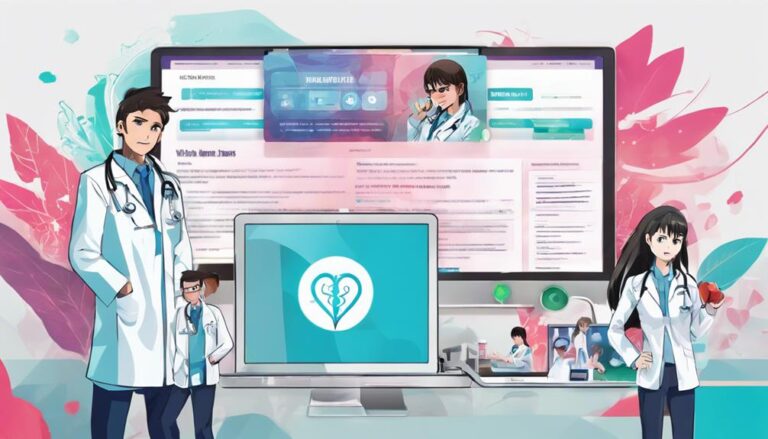Networking for Healthcare Sales Success: Building Relationships
When it comes to excelling in healthcare sales, networking is key. Building strong relationships is essential in this industry. Establish trust by prioritizing personal connections. Stand out by offering a personalized approach. Follow up promptly after industry events, and practice your elevator pitch. Demonstrate expertise and listen actively to stakeholders. Use social media wisely and connect with key influencers. Collaborate with healthcare providers and communicate effectively. Master follow-up strategies and proper networking etiquette. Referral partnerships can lead to growth. Measure your success by setting specific goals. These tips will guide you toward healthcare sales success.
Key Takeaways
- Prioritize relationship building to establish trust and credibility.
- Personalize your approach to set yourself apart from competitors.
- Implement event networking strategies for meaningful connections.
- Follow up promptly after events to solidify connections.
- Target key individuals strategically for valuable connections.
Importance of Networking in Healthcare Sales
Networking plays an essential role in healthcare sales success, facilitating valuable connections and fostering relationships that can drive growth and opportunities. Building rapport is vital in the healthcare industry, where trust and credibility are paramount. When you prioritize relationship building through networking, you establish a foundation of trust with potential clients, making it more likely for them to choose your products or services.
In healthcare sales, the ability to connect with clients on a personal level is a powerful tool. By actively engaging in networking opportunities, you not only showcase your expertise but also demonstrate your genuine interest in understanding the needs of healthcare professionals. This personalized approach can set you apart from competitors and position you as a trusted partner in the industry.
Leveraging Industry Events for Networking
When attending industry events for networking in healthcare sales, consider implementing event networking strategies that focus on building meaningful connections.
Approach targeted individuals with a personalized and genuine interest in their work, creating a foundation for valuable relationships.
Remember to follow up promptly and effectively after the event to solidify your connections and leave a lasting impression in the competitive healthcare sales industry.
Event Networking Strategies
Attending industry events offers a prime opportunity to forge valuable connections and expand your network within the healthcare sales sector. To make the most of these events, consider practicing your elevator pitch in advance. This concise introduction should highlight your expertise and what sets you apart.
Additionally, engage in icebreaker activities to initiate conversations and establish rapport with fellow attendees. Remember, these events aren't just about exchanging business cards but about building meaningful relationships. Approach each interaction with authenticity and a genuine interest in others.
Targeted Connections Approach
To maximize the impact of your presence at industry events, focus on strategically connecting with key individuals who align with your goals in healthcare sales. Engage in personalized outreach to forge meaningful relationships with industry connections.
Here's how to make the most out of your networking efforts:
- Research and Prioritize: Identify key players in the healthcare sales field attending the event and prioritize connecting with them.
- Customize Your Approach: Tailor your conversations to each individual, showcasing your understanding of their work and how you can collaborate effectively.
- Follow-Up with Purpose: After the event, continue the conversation with a personalized follow-up to reinforce the connection and explore potential opportunities together.
Follow-Up Best Practices
Maximizing your networking opportunities at industry events involves implementing effective follow-up strategies that solidify connections and foster collaboration in healthcare sales. Follow-up timing is essential; aim to reach out within a week after meeting someone to keep the interaction fresh in their mind.
Personalize your follow-up by referencing a specific point of discussion or common interest to demonstrate your attentiveness. Utilize various communication channels such as email, phone calls, or social media to maintain contact and build rapport.
Keep your messages concise, professional, and focused on adding value to the relationship. Remember, consistency is key in nurturing connections over time. By employing these relationship-building techniques and tips, you can establish lasting partnerships and drive success in healthcare sales.
Building Trust With Key Stakeholders
Building strong relationships with key stakeholders in healthcare sales requires consistent communication and transparency. To build trust with these stakeholders, you must prioritize credibility and rapport. Here are three key strategies to help you establish trust and foster meaningful connections:
- Demonstrate Expertise: Show your understanding of the healthcare industry, including regulations, challenges, and trends. By showcasing your knowledge, stakeholders will see you as a valuable resource.
- Listen Actively: Take the time to listen to the needs and concerns of stakeholders. By showing genuine interest and empathy, you can build trust and strengthen your relationships.
- Follow Through: Deliver on your promises and commitments. Whether it's providing information, following up on inquiries, or offering solutions, consistency in your actions will help solidify trust with key stakeholders.
Utilizing Social Media for Connections
When using social media to connect with stakeholders in healthcare sales, engaging authentically and strategically can greatly enhance your networking efforts. LinkedIn connections and Twitter networking are powerful tools at your disposal.
On LinkedIn, make sure your profile is professional and up-to-date, showcasing your expertise and experience in healthcare sales. Connect with key stakeholders such as decision-makers in hospitals or healthcare organizations. Engage with their content by commenting thoughtfully or sharing relevant industry insights. This helps in building rapport and staying on their radar.
Twitter networking is another avenue to explore. Follow healthcare influencers, organizations, and potential leads. Retweet and like their posts, and join conversations using relevant hashtags. Direct message individuals to start one-on-one conversations and explore potential collaboration opportunities.
Networking With Healthcare Providers
To expand your network and strengthen your relationships in healthcare sales, connecting with healthcare providers directly can be a valuable strategy. Building connections with healthcare providers opens doors to new opportunities and collaborations. Here are three key ways networking with healthcare providers can benefit your sales efforts:
- Referral partnerships: Establishing relationships with healthcare providers can lead to mutual referral agreements. When healthcare professionals trust your products or services, they're more likely to refer patients to you, boosting your sales opportunities.
- Provider collaborations: Collaborating with healthcare providers on projects or events can increase your visibility within the healthcare industry. By working together on initiatives like educational workshops or community health fairs, you can showcase your expertise and strengthen your reputation among providers.
- Knowledge exchange: Networking with healthcare providers allows for a valuable exchange of industry insights and best practices. By engaging in discussions with providers, you can gain valuable knowledge that can help tailor your sales approach to better meet their needs and expectations.
Nurturing Relationships for Long-Term Success
To build enduring relationships in healthcare sales, remember that trust is the cornerstone of loyalty.
Ensuring open and effective communication will be pivotal in fostering strong connections with healthcare providers.
Trust for Loyalty
Building strong trust with your clients is the cornerstone of fostering loyalty and ensuring long-term success in healthcare sales. To achieve this, it's vital to empathize with your clients' needs, communicate transparently, and consistently deliver on promises. Here's how you can do it:
- Empathize: Understand your clients' challenges and show genuine care for their well-being. Building rapport based on empathy creates a strong foundation for trust.
- Transparency: Be honest about what your products or services can offer. Transparency builds credibility and showcases your commitment to your clients' best interests.
- Consistency: Maintain relationships by following up regularly, providing support, and demonstrating reliability. Consistent actions over time reinforce trust and loyalty, leading to enduring partnerships.
Communication Key for Connections
Effective communication serves as the foundation for nurturing strong connections in healthcare sales, paving the way for long-term success and mutually beneficial relationships. In this competitive industry, mastering the art of effective listening is paramount.
Take the time to truly understand your clients' needs, concerns, and preferences. By actively listening and acknowledging their perspectives, you demonstrate empathy and build trust. Additionally, pay attention to nonverbal cues during conversations. Body language can convey valuable information about a person's thoughts and emotions.
Strategies for Effective Follow-Ups
When following up with potential clients in healthcare sales, it's crucial to maintain consistent communication to nurture relationships and move prospects closer to a decision. To achieve success in your follow-ups, consider the following strategies:
- Timely Follow-Ups: Guarantee you reach out promptly after initial contact to stay fresh in the prospect's mind and demonstrate your dedication.
- Personalized Communication: Tailor your messages to each client's specific needs and concerns, showing that you value their individual requirements and are attentive to their preferences.
- Persistence Pays Off: Be persistent but respectful in your follow-ups, understanding that building relationships and closing deals often require multiple touchpoints to solidify trust and interest.
Networking Etiquette in Sales
Networking etiquette is essential in the world of healthcare sales. Knowing the dos and don'ts, as well as mastering professional communication tips, can set you apart from the competition.
Etiquette Dos and Don'ts
To excel in sales networking, it's crucial to adhere to proper etiquette guidelines that can enhance your professional relationships and boost your success in the healthcare industry. When attending networking events, remember these etiquette dos and don'ts:
- Do: Approach conversations with a genuine interest in others' work.
- Don't: Oversell or dominate discussions; focus on building connections.
- Do: Follow up with a thank-you message or email after meeting someone new.
Professional Communication Tips
Approaching professional communication with finesse and tact is vital to making lasting impressions and cultivating fruitful relationships in healthcare sales networking.
In this situation, active listening plays an essential role. When engaging in conversations, focus on what the other person is saying rather than just waiting for your turn to speak. This shows genuine interest and helps in building trust.
Additionally, pay attention to body language cues. Non-verbal signals can convey a lot about a person's feelings and intentions. Maintain eye contact, use open gestures, and make sure your posture is welcoming to show that you're engaged and approachable.
Leveraging Referrals for Growth
When seeking to maximize your healthcare sales success, tapping into the power of referrals can greatly boost your growth potential. Referral partnerships are a valuable asset in expanding your client base and increasing revenue. Here are three key strategies to leverage referrals effectively:
- Cultivate Strong Relationships: Building trust and rapport with existing clients can lead to them recommending your services to others in their network. By providing exceptional value and personalized attention, you can turn satisfied clients into loyal advocates.
- Offer Incentives: Encourage referrals by implementing a rewards program for clients who bring in new business. Incentives such as discounts on future purchases or exclusive access to special events can motivate clients to refer their friends and colleagues.
- Follow Up Promptly: When a referral is made, act quickly to contact the prospect. Timely follow-ups demonstrate professionalism and commitment, increasing the likelihood of converting referrals into actual sales.
Measuring Networking Success
Maximizing your healthcare sales success through referrals requires a clear method of measuring networking success to track the effectiveness of your efforts and optimize future strategies. To measure progress accurately, start by setting specific networking goals. These goals could include the number of new connections made, the percentage increase in referrals received, or the quality of leads generated through networking events.
One way to measure networking success is by tracking the number of referrals received from each networking interaction. By keeping a record of this data, you can identify which networking activities are yielding the best results and focus your efforts on those that are most effective. Additionally, monitoring the conversion rate of referrals into actual sales can provide valuable insights into the overall impact of your networking efforts.
Conclusion
As you continue to navigate the world of healthcare sales, remember that networking isn't just about making connections, but about building meaningful relationships.
By consistently engaging with industry events, key stakeholders, and healthcare providers, you're laying the foundation for success. Keep following up, practicing good networking etiquette, and leveraging referrals to see your efforts pay off.
Trust the process and watch your network grow and your sales soar. Good luck on your journey to healthcare sales success!







